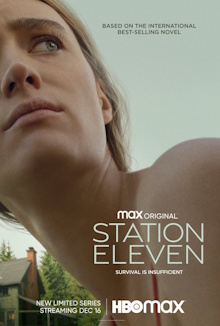I was frustrated for so long in the process of watching this series. After a rather conventional first episode, it confusingly leaps around, seemingly refusing to be tied down to any particular time and place. I was also frustrated that it has no interest in the plausible logistics of survival in an end-of-the-world scenario and so felt increasingly unrealistic. But then as the multiple threads combine, I finally realize how everything just fits. As a Broken Forum poster pointed out, this is really about trauma and healing from it in different ways. There are many parts of its message that I dislike but I can’t deny that this is one perfectly planned and crafted standalone series.
During a stage performance of King Lear in Chicago, celebrated actor Arthur Leander suddenly dies. A member of the audience, Jeevan Chaudhary, rushes onto the stage despite not having medical training. During the confusion, he notices that child actress Kirsten Raymonde is left by herself and offers to take her home. On the way however Jeevan notices reports of the hospitals being overwhelmed by flu cases on the news. His sister who is a doctor calls him to say that the flu is deadly and tells him to go to his brother Frank’s apartment and barricade themselves there. When Jeevan and Kirsten arrive at her home, he finds that she doesn’t have a key and nobody is home. So he reluctantly takes her to Frank’s place after buying many grocery carts’ worth of food. Society slowly starts to break down as they walk there and just as they arrive, they see a plane spectacularly crash outside the windows of the building. They would stay there for over eighty days as human civilization is destroyed by a pandemic. Flash forward twenty years later, Kirsten is now grown up and is part of a troupe of travelling actors in the post-pandemic world. In her possession is a worn copy of a graphic novel called Station Eleven that was gifted to her by Arthur Leander.
For a long time, I found it very frustrating to grapple with what the series wants to convey. At first glance, it shares obvious similarities with The Last of Us, but it is a different beast entirely. Interspersed throughout are quotes from the graphic novel that are repeated again and again. It felt that the book played the role of a McGuffin that ties the characters together and it somehow resonates with them yet doesn’t feel at all profound to me. The series also has no interest in logistical details or realism, so a troop of children in the wild can somehow always feed themselves. It took a while for me to accept that this is entirely by design and the series falls squarely within the genre not of science-fiction but magical realism. It takes liberties with plausibility to tell a story about how different generations of people have been traumatized by the end of the world and how they heal from it. It’s incredibly well-planned from beginning to end, so the lines from the graphic novel do matter, so do the performances of Hamlet by Kirsten’s troupe and even the roles of the supporting characters. I’m miffed that this is yet another show that is so artist-centric. Almost every character of note is an actor, a musician, an artist and so on, implying that it is art that gives meaning to life after the end of the world. But it does work and is emotionally resonant.
There are threads in its messaging that I dislike and that I think is inconsistent. The Prophet’s drawing a line between the traumatized pre-Pans and the free post-Pans seems to earn Kirsten’s sympathy eventually. At the same time, she never seems to hold him to account for having his followers use bombs to attack communities. Similarly Kirsten’s personal growth is exemplified by her learning to put down her knife. Yet not long before that, her group was attacked by assailants whose origins are never explained and they would have been wiped out if not for her knife skills. So it’s a feelings and vibes focused show that skips over the issues with hard power and practical realities. It may have amazing character development but I just don’t believe in the post-pandemic world it paints around the people.
So in essence we have a show that is undeniably well-made, is tightly written such that its disparate elements mesh perfectly at the end and even makes excellent use of the Station Eleven graphic novel at its center. It’s also very satisfying to have a standalone series like this that tells a complete story in a single season. However it is very much not my kind of show as its vibes don’t match me at all even if I suspect that many will enjoy it.
